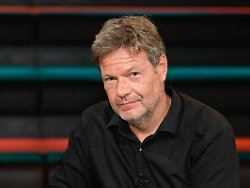Wednesday 20th October 2021
Robert Habeck with Markus Lanz
“Will grow into a new world”
By Marko Schlichting
Even if he does not want to admit it at the moment: Green politician Robert Habeck would like to be finance minister in a new traffic light government. That wouldn’t be the worst line-up, you think when you see him as a guest at Markus Lanz.
It’s one of those things with financial policy. The topic is considered dry. Taxes are only interesting if you don’t have to pay them or if someone is caught who has evaded them. Financial politicians are mostly perceived as boring bean counters who are to blame when important election promises are once again not implemented. Should a traffic light government come about after the coalition talks, that could change. Because with the Greens co-leader Robert Habeck and FDP leader Christian Lindner, two politicians are competing for the office of finance minister who are able to explain financial policy in an understandable and sometimes even entertaining way. Robert Habeck showed how it could work on Tuesday evening in the talk show with Markus Lanz on ZDF.
“Exploratory papers are spongy”
Markus Lanz’s critical questions bounce off Habeck. During the entire program, he is calm and self-confident, appears competent. That has something to do with Finance Minister Olaf Scholz. The calm remains even where it is not a question of financial policy, but rather, for example, that much of the current exploratory paper is vaguely worded. “Exploratory papers are vague because they are exploratory papers and not bills,” explains Habeck.
It is clear to him that the Greens have failed with some demands. These include the speed limit on motorways and the ban on domestic flights. Yes, says Habeck, the speed limit had been discussed, it is now canceled. “One of the coalition partners didn’t want that.” However, with the end of the fossil combustion engine, an important demand by the Greens was enforced, says Habeck. “In terms of climate policy, this is the far more important topic.” In addition, the goal has been set to bring the coal phase out to 2030. “This is an important stage win,” said Habeck. The energy money demanded by the Greens will not come either. This is technically too difficult to implement, says Habeck. In return, however, the EEG surcharge should first be reduced and later abolished, a saving for a four-person household of around 300 euros per year.
With the traffic light coalition something is emerging that has never been seen before: a new dynamic, “where new things arise, where trust is built and where nobody feels ripped off. Habeck justifies the concessions made by the Greens in the exploratory talks.
“Söder will also have to build wind turbines”
In the coalition negotiations, Habeck is not concerned with trifles. “These days, politics must give this country a government that does not always play with the lowest common denominators,” he is sure. The SPD, FDP and the Greens tried to form a government that can make clear decisions. This includes switching to new energies such as wind power. Two percent of the area of Germany is to be used for the construction of wind power plants. All federal states would have to adhere to this. “We will grow into a new world that is based exclusively on renewable energies,” says Habeck. The security of supply will be based on this, and this must be guaranteed nationally through a joint effort. “Even Markus Söder in Bavaria will have to build new wind turbines,” says Habeck. That should be in the coalition agreement.
And: The future coalitionists want to accelerate the planning of such systems. In the future, according to Habeck, only the areas for their construction should be shown, individual permits for power plants should then no longer be given.
The thing with the debt brake
However, the new government will have one problem with its endeavors: the money. New projects have to be financed, while maintaining the debt brake. That is what the FDP wants. According to Habeck, there is one point where the coalition partners agree: some subsidies should be dropped. On the other hand, climate protection should be funded – with 50 billion euros annually. “It will not fail because of the money to make Germany climate neutral,” says Habeck. Financing is not a problem here, because renewable energies would also bring in money again. Habeck also proposes an investment fund like the one that already exists in some federal states.
This requirement is not new. The Greens had already called for an investment fund before the elections. There are various ideas of what something like this could look like. For example, the government could borrow money from companies in order to put it into certain projects in which the companies in turn can participate and earn.
One thing is clear: the problems with financing an energy conversion in particular are huge. But they can be solved, says Habeck. And he is looking forward to the coalition talks. “It could be possible,” he says, “that parties with opposing positions can achieve something in common.”
